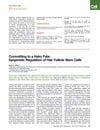16 citations,
September 2019 in “Journal of biological chemistry/The Journal of biological chemistry” Mice without certain skin enzymes have faster hair growth and bigger eye glands.
36 citations,
January 2016 in “The journal of investigative dermatology/Journal of investigative dermatology” The document concludes that understanding genetic mutations in the PI3K-AKT-mTOR pathway can lead to better diagnosis and treatment for certain genetic skin disorders.
 479 citations,
January 2005 in “BioEssays”
479 citations,
January 2005 in “BioEssays” Hair follicle development is controlled by interactions between skin tissues and specific molecular signals.
[object Object] Whale oil significantly promotes hair growth and may be a safe, effective alternative to minoxidil.
 30 citations,
June 2012 in “Current Opinion in Endocrinology, Diabetes and Obesity”
30 citations,
June 2012 in “Current Opinion in Endocrinology, Diabetes and Obesity” Nonclassic congenital adrenal hyperplasia is a genetic disorder causing hormone imbalances, affecting fertility and requiring personalized treatment.
 43 citations,
February 2013 in “Developmental dynamics”
43 citations,
February 2013 in “Developmental dynamics” Foxi3 expression in developing teeth and hair is controlled by the ectodysplasin pathway.
98 citations,
May 2016 in “Genes” Understanding wool keratin-associated proteins in sheep can help improve wool quality through selective breeding.
 13 citations,
September 2011 in “Archives of dermatology”
13 citations,
September 2011 in “Archives of dermatology” A patient with steroid sulfatase deficiency had a unique hair pattern and a brain malformation not previously linked to the condition.
 5 citations,
September 2011 in “Cell stem cell”
5 citations,
September 2011 in “Cell stem cell” Epigenetic changes are crucial for hair follicle stem cells to function properly.
 January 2025 in “Frontiers in Cell and Developmental Biology”
January 2025 in “Frontiers in Cell and Developmental Biology” Hox proteins help maintain keratinocyte identity by regulating miRNA expression.
6 citations,
June 2012 in “PloS one” A new mRNA variant of the SCF gene in sheep skin produces a shorter, different protein.
 55 citations,
March 2012 in “Journal of Investigative Dermatology”
55 citations,
March 2012 in “Journal of Investigative Dermatology” Research on epidermal stem cells has advanced significantly, showing promise for improved clinical therapies.
 56 citations,
December 2011 in “The Plant Journal”
56 citations,
December 2011 in “The Plant Journal” AGD1 is important for root hair development in Arabidopsis, working with phosphoinositide signaling and the actin cytoskeleton.
 1 citations,
July 2023 in “Nature communications”
1 citations,
July 2023 in “Nature communications” MOF controls key genes for skin development by regulating mitochondrial and ciliary functions.
 6 citations,
July 2023 in “Nature cell biology”
6 citations,
July 2023 in “Nature cell biology” SOX9 helps determine stem cell roles by interacting with DNA and proteins that control gene activity.
85 citations,
January 2018 in “Cell stem cell” Different signals work together to change gene activity and guide hair follicle stem cells to become specific cell types.
 20 citations,
June 2014 in “BMC genomics”
20 citations,
June 2014 in “BMC genomics” Poplar seed hairs grow from the placenta at the ovary base, with endoreduplication playing a key role in their development, and share similar cellulose synthesis processes with cotton fibers.
 January 2024 in “Frontiers in plant science”
January 2024 in “Frontiers in plant science” The zinc finger protein 3 in Arabidopsis thaliana reduces plant growth and root hair development.
218 citations,
September 2012 in “Gastroenterology” Colorectal cancer development involves both genetic changes and epigenetic alterations like DNA methylation and microRNA changes.
[object Object] 
Plant roots respond to fungus smells by possibly using certain proteins and a plant hormone to change root growth, but more research is needed.
143 citations,
May 2017 in “Nature cell biology” Wounded skin cells can revert to stem cells and help heal.
31 citations,
November 2015 in “PloS one” Reducing Tyrosinase prevents mature color pigment cells from forming in mouse hair.
49 citations,
March 2017 in “PubMed” Enhancers and super-enhancers are key in controlling specific gene activity and can play a role in cancer development.
February 2024 in “Epigenomes” Epigenetic mechanisms control skin development by regulating gene expression.
 356 citations,
March 2012 in “Trends in Plant Science”
356 citations,
March 2012 in “Trends in Plant Science” Auxin and ethylene hormones both work together and against each other to control plant growth.
 11 citations,
January 2000 in “Journal of Cutaneous Pathology”
11 citations,
January 2000 in “Journal of Cutaneous Pathology” Short telomeres contribute to aging and cancer, and while telomerase can delay aging, it may also promote cancer.
 2 citations,
December 2022 in “bioRxiv (Cold Spring Harbor Laboratory)”
2 citations,
December 2022 in “bioRxiv (Cold Spring Harbor Laboratory)” miR-29 is a key factor that accelerates aging.
2 citations,
June 2017 in “The journal of investigative dermatology/Journal of investigative dermatology” Epigenetic factors play a crucial role in skin health and disease.
 257 citations,
July 2018 in “Obstetrics & Gynecology”
257 citations,
July 2018 in “Obstetrics & Gynecology” PCOS is a complex disorder in women that can lead to various health risks and requires personalized treatment.
 7 citations,
March 2018 in “Journal of The American Academy of Dermatology”
7 citations,
March 2018 in “Journal of The American Academy of Dermatology” Skin changes like hair loss, white patches, and nail changes are common in children after bone marrow transplants, often linked to chronic rejection.

















